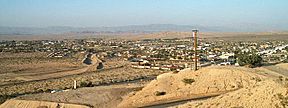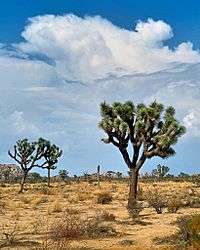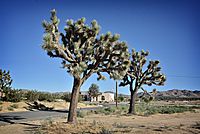Morongo Basin facts for kids
Quick facts for kids Morongo Basin |
|
|---|---|

Twentynine Palms and the Morongo Basin.
|
|
| Naming | |
| Native name | Error {{native name}}: an IETF language tag as parameter {{{1}}} is required (help) |
| Geography | |
| Location | San Bernardino County |
| State | California |
| Region | Mojave Desert |
The Morongo Basin is a special valley area in eastern San Bernardino County, Southern California. It's called an endorheic basin because water flows into it but doesn't flow out to the ocean. Instead, it collects in lakes or evaporates.
This area is part of the Inland Empire region. It is also seen as the eastern edge of the Greater Los Angeles Area.
Contents
Exploring the Morongo Basin's Geography

The Morongo Basin stretches a long way. It goes from the Little San Bernardino Mountains in the south, near Interstate 10, up to the Interstate 40 area in the north. This basin is located within the Mojave Desert.
It sits east of the city of San Bernardino and the San Bernardino Mountains. To its north are the Coachella Valley and the Colorado Desert. The Morongo Basin is also part of the High Desert region of Southern California.
The land here can be as low as 1950 feet (594 meters) in Twentynine Palms. It rises to about 3000 feet (914 meters) in Yucca Valley. Higher parts of Joshua Tree National Park are also found within this basin. The landscape is a desert with hills and sandy plains, surrounded by mountains.
Amazing Plants and Animals
The Morongo Basin is home to unique desert plants. The Mojave yucca is one important plant. It's the plant that gave Yucca Valley its name! Another famous plant is the Joshua tree. This tree is so special that it gave its name to Joshua Tree city and the national park.
Many animals also live in these desert habitats. You might spot Black-tailed jackrabbits hopping around. Coyotes are also common here. But watch out for the Mojave Rattlesnake, a venomous snake that lives in the basin.
Towns and Cities in the Basin
The Morongo Basin has several towns and communities. Some are larger, while others are smaller.
Towns with More Than 15,000 People
Smaller Communities (Under 15,000 People)
- Morongo Valley
- Landers
- Pioneertown
- Joshua Tree
- Marine Corps Air Ground Combat Center Twentynine Palms
- Wonder Valley
Morongo Basin's Climate
The climate in the Morongo Basin is a dry desert climate. Summers are very hot and dry. Winters are cool, with cold mornings. Sometimes, there are snow and rain showers. Snow usually falls in areas that are above 1500 feet (457 meters) in elevation.
Here's a look at the average monthly temperatures in Twentynine Palms:
| Twenty Nine Palms: Monthly Normal High and Low Temperatures | |||||||||||||
| Month | Jan | Feb | Mar | Apr | May | Jun | Jul | Aug | Sep | Oct | Nov | Dec | Year |
|---|---|---|---|---|---|---|---|---|---|---|---|---|---|
| Avg high °F | 64 | 69 | 75 | 83 | 91 | 101 | 106 | 104 | 97 | 86 | 72 | 54 | |
| Avg low °F | 36 | 39 | 43 | 49 | 57 | 65 | 71 | 80 | 64 | 52 | 41 | 35 | |
Fun Places to Visit
The Joshua Tree National Park is a huge draw for visitors to the Morongo Basin. People come from all over to see its unique trees and rock formations. Another interesting spot is the Desert Christ Park sculpture garden in Yucca Valley. It features many large sculptures.
The Sand to Snow National Monument surrounds the Morongo Valley. It has several cool places to explore:
- The Big Morongo Canyon Preserve is at the southern entrance to the valley. It's a great place for birdwatching.
- The Pacific Crest Trail passes through this area. It's a famous long-distance hiking trail.
- Mount San Gorgonio rises above the basin to the west. It is the highest point in Southern California.
Learning and Education
The Morongo Unified School District serves all the cities and communities in the Morongo Basin. This district provides education for local students. For those looking for higher education, Copper Mountain College is the only community college in the area. It is located in Joshua Tree.
The closest four-year public university is California State University, San Bernardino. It is located north of the city of San Bernardino.
 | Audre Lorde |
 | John Berry Meachum |
 | Ferdinand Lee Barnett |


